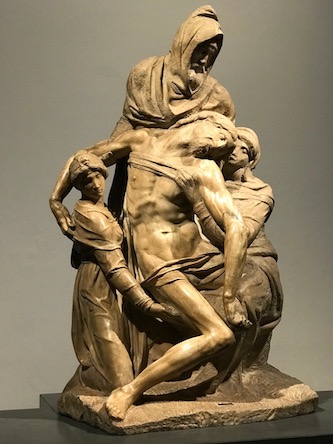Last month, while in Europe visiting family, my husband, daughter and I went to Florence. We spent three days looking at various well-known works of renaissance art and architecture… to the point where our daughter’s refrain became, “No more art, please!”
Amongst the hundreds of beautiful works by famous artists there was one that particularly stood out to my husband and me: it was Michelangelo’s unfinished Bandini Pieta which is housed in the Duomo Museum.
Unlike most versions of La Pieta which show only Mary holding Jesus’ body, just removed from the cross, this particular version features four figures. The two most prominent are Jesus and Nicodemus. The latter is actually a self-portrait of Michelangelo, who in his later years became a devout follower.
The other, figures are Mary, mother of Jesus and Mary Magdalene. However, as I’m transported through this sculpture back to this moment in time, I’m aware of other “invisible players.” The first is the Father who, like Nicodemus, looks down on Jesus’ lifeless body with a sorrow so deep it seems to stop time itself. The second is a Roman guard whose puzzled gaze shifts back and forth between his spear and Jesus’ side. He shuffles his feet uncomfortably, sensing something big is going on, and that he’s played a role... but not comprehending.
Eternal Truth

I’m aware that Bandini Pieta does not represent any actual historical moment. I suspect Michelangelo knew this as well, however he was out to capture an eternal truth, rather than a historical one. The truth? This is what sin costs. This is what it cost our loving God.
We, the final character in this true drama are invited to stand and behold in shock and horror what we have done to Him. We have betrayed the one who loved us most. The death of God is the result.
This is a sacred moment and if we do nothing else we must behold and feel the magnitude of it.
Then, if we dare… we can move to enter into the scene. We can feel the loss and sorrow as hugely personal. Our friend, our dearest love lies dead in our arms.
A Word for the SA Husband
I believe the Pieta scene plays out regularly in the world, in modified form. For many a woman, when she finds out that the man she most loved has betrayed her (or betrayed her again), it’s like a near-mortal wound. Rather than Nicodemus holding Jesus’ lifeless, sin-battered body—as in Bandini Pieta—Jesus holds the sin-battered body of your wife. She is severely wounded, but thanks to Him, not dead.
God’s attention is on her, to minister to her. This is a sacred moment.
Allow the Father to put His hand on your shoulder. He wants to minister to you as well, but right now, the best thing He can do for you is help you focus your attention on her. This is what you have done to her. You have betrayed the human being who loved you most. He calls you to enter into His perspective and feel the pain and gravity of this moment.
Entering In
However, most SA husbands find it easier to take the position of the Roman soldier in my extended version of Michelangelo’s scene. As with the soldier, their focus is primarily on the weapon in their hand (their addiction). The soldier will sometimes glance at the limp body nearby in confusion, as if to say, “Wow, how did that happen?” Then he may start making plans for how to deal with the spear, which is clearly responsible for much of what’s going on here.
But God wants you to follow His gaze. He will attend to you and the spear before long. For the moment His attention is on your wife’s near lifeless body that His son is ministering to. Stand still and feel the shock and horror. This is what sin costs. This is what your sin has cost your loving wife… and before her, your even more loving Saviour.
He wants to show you how He feels about their pain… how He enters into it.
Try to follow Him there. It means letting go of the spear, forgetting your shame and discomfort and taking up a position in the scene—with Him, her, and them—supporting her wounded soul.
It’s not easy, but if you dare to enter into this sacred moment you will become part of the community of healing, and in losing your life… find it.
On the Brink of Death,
To Giorgio Vasari
Sonnet LXV
by Michelangelo
The course of my life has brought me now
Through a stormy sea, in a frail ship,
To the common port where, landing
We account for every deed, wretched or holy.
So that finally I see
How wrong the fond illusion was
That made art my idol and my King,
Leading me to want what harmed me.
My amorous fancies, once foolish and happy
What sense have they now that I approach two deaths
The first of which I know is sure, the second threatening.
Let neither painting nor carving any longer calm
My soul turned to that divine Love
Who to embrace us opened His arms upon the cross.
This Good Friday, let us not just "pass by" but stop and consider His sorrow.


